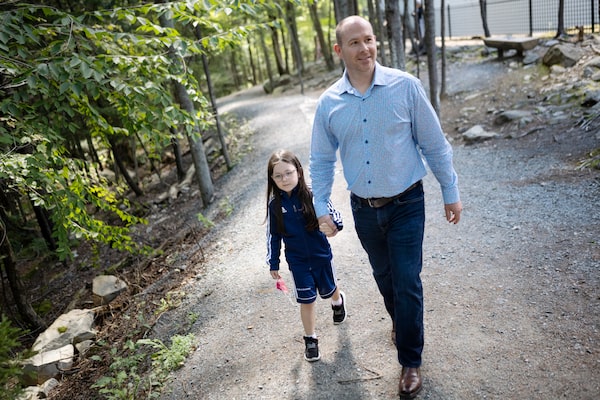
Lucas Wide walks with his five-year-old daughter London. Her parents were impressed with how Bedford Academy in Nova Scotia handled the pandemic and she began Grade 1 there this year.DARREN CALABRESE/The Globe and Mail
Five-year-old London Wide started in the junior primary program at Bedford Academy in the fall of 2019. Her parents had planned to move her to the public system for elementary school, but they were so impressed with Bedford’s handling of the COVID-19 pandemic that their daughter just entered Grade 1 at the private school.
“A main reason was how they dealt with COVID-19 and the quality of education that London received even as a pre-primary student going virtual. And then we had great confidence in her returning to that school,” says London’s father, Lucas Wide.
Just as COVID-19 factored into the Wide’s decision to keep their daughter at Bedford Academy, private school administrators say the pandemic has spurred more inquiries from parents and boosted enrolment numbers.
Though it could not take on many more students due to capped class sizes, school director Nancy Wallace says 23 new students started at Bedford Academy this year. The co-ed private school, which offers preschool to Grade 9 in Bedford, N.S., has a total of 200 students.
“Parents have been happy with how we have handled the pandemic and with our safety protocols,” Wallace says. This included starting virtual learning the Monday following March break in 2020, when many schools needed more time to prepare for the move online after the pandemic was declared and everything locked down. “Our staff met online that Friday evening to navigate our way, as Zoom was new to most of our staff. They rose to the occasion and began regular classes Monday morning.”
Wide was impressed that London’s schedule remained identical to her in-person day. When she returned to campus, Wide says he felt reassured by the small class sizes and the school’s investment in air purifiers for each classroom. “There was an extra layer of comfort in the extra steps the school took that made it an easy decision to continue there,” he says.
UMCA Rich Tree Academy, a K-12 private school in Vaughan, Ont., has been operating since 2003. For the first time since it opened, the school had to turn away students this year, says marketing manager Alina Pinsky.
From the 2019-20 school year to last year, the number of elementary students at UMCA Rich Tree Academy increased by more than 80 per cent, from 92 to 170. In high school, there was a 50-per-cent increase. Pinsky says 85 per cent of students who started last year returned this September, with another 50-per-cent increase in high school students and 10-per-cent increase in elementary students compared to last year.
The school hired five new teachers and two administrative staff this year and had recently moved to a new building with more classrooms, which allowed it to accommodate its growing numbers.
Pinsky attributes the increased interest in the school to its small class sizes, which are capped at 15 students, and the ability to adapt and even increase programming during the pandemic. She believes these new students will return. “I’m confident we will be able to keep this up. Parents really love that we provide individualized attention to the students,” she says. “With small class sizes, teachers can pinpoint who is struggling and may need extra help and the students who may be bored and are ready to move ahead.”
Stephanie Marchment, admissions director at The Clover School in Toronto, is also confident the enrolment boost is more than temporary.
“I think once parents are in the school, they see the benefits of being within an independent private school,” she says. “We strive to create that family, community feel. Once parents are part of our community, that’s really important to them and it’s important to the kids. I think that we’ll see them continue with us throughout the years.”
Like other administrators, Marchment credits smaller class sizes to helping parents feel more comfortable sending children to school during the pandemic. “Each of our campuses has no more than about 150 students. So it is a smaller pool of children and our class sizes are typically 10 to 20 students,” she says. “With a private school, the parents really get to know each other and it feels like family. The whole environment is really trusting, so you can know that everyone is following the rules. So there is just that comfort level.”
Marchment says the school has seen an increase in inquiries and enrolment. The independent Montessori school opened a third campus during the pandemic to accommodate the growth and some of its programs have a wait list. The school has also added resources and hired more teachers. While Marchment used to handle admissions herself, she now has staff members dedicated to fielding email and phone inquiries and handling school tours, registration and student onboarding.
“We are doing similar things to the public schools, but I think we have an ability to pivot more quickly than the traditional school system because they have multiple levels of bureaucracy,” Marchment says. For example, The Clover School was able to enhance outdoor education, hire additional cleaners, institute a daily COVID-19 screening app and get an HVAC company early in the pandemic to install a new air filtration system and standalone filters in classrooms.
The school was also able to address parents’ concerns about their children falling behind due to the upheaval of the pandemic, Marchment says. “This has always been our philosophy,” she explains. “We individualize learning so we’re able to meet children’s needs. We can quickly see what their gaps are in learning and help fill them.”
Looking for more stories about private school education? Get the latest on curriculum trends, financial assistance and the pandemic’s impact here.